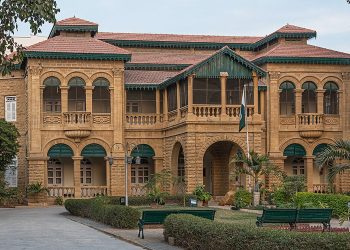The antiquities smuggled from Pakistan’s Balochistan province to France, which were seized by French authorities, have been returned to Pakistan and sent back by the Pakistani Embassy in Paris.
According to national media, these antiquities from Balochistan were seized by French customs in recent years. They were first handed over to the Pakistani Embassy in Paris and have now been sent to Pakistan. The historically valuable antiquities were seized by French customs under the 1970 UNESCO Convention.
In recent years, a large number of ancient artifacts smuggled from Balochistan were confiscated by French customs officials. After verification, these artifacts were handed over to the Pakistani Embassy in Paris. Officials at the Pakistani Embassy in Paris remained in contact with the French government in this regard, and the recovered antiquities have now been sent to Pakistan.
Also Read: Archeologists discover 400 Buddhist antiquities in Swabi
French customs returned these valuable artifacts to Pakistan under the 1970 UNESCO Convention. According to this convention, valuable antiquities illegally smuggled from a country are returned to their country of origin, although a procedure must be followed before this process.
It is worth noting that earlier, in 2019, France had also handed over 450 antiquities dating back to 4000 BCE to Pakistan. These had been seized by French customs officials a decade earlier. According to a report by news agency AFP, in 2006, customs agents at a Paris airport seized a parcel arriving from Pakistan that contained 17 clay vessels, which were supposed to be taken to a museum.
It was initially claimed that the artifacts were over 100 years old, but an expert who examined them concluded that they dated back to 2000 or 3000 BCE and may have been stolen from ruins in Balochistan. Investigations continued for a year, during which a raid was conducted on the Harris Gallery. Investigators discovered 445 items dating back to 4000 BCE, valued at 139,000 euros (157,000 dollars).
Notably, antiquities are vital to a nation’s cultural identity and historical continuity. They serve as tangible links to a country’s past, offering insight into the lives, beliefs, and achievements of earlier civilizations. For Pakistan, with its rich and diverse heritage stretching from the Indus Valley Civilization to Islamic empires, antiquities are not merely artifacts—they are key components of national pride and cultural understanding.
Preserving these relics allows future generations to connect with their roots, study their history with authenticity, and foster a sense of unity and continuity. Furthermore, they contribute to academic research and education, helping scholars reconstruct historical narratives with greater accuracy.
Globally, antiquities play a crucial role in promoting cross-cultural understanding and global heritage conservation. Every country’s artifacts are pieces of the larger puzzle of human civilization, and their preservation ensures that humanity’s shared history is not lost.
The illegal trafficking and smuggling of antiquities not only strip nations of their cultural wealth but also disrupt the integrity of the world’s historical record. When protected and respected, antiquities can boost tourism, support local economies, and serve as symbols of international cooperation when repatriated. Thus, safeguarding antiquities is not just a national responsibility—it is a global imperative
Why France’s Step Is Praiseworthy
France’s decision to return Pakistan’s smuggled antiquities is a commendable and responsible step that reflects a growing global commitment to cultural justice and heritage preservation.
By returning these artifacts, France has not only acknowledged Pakistan’s rightful ownership of its historical treasures but has also set a positive example for other nations holding unlawfully acquired cultural property. This act strengthens diplomatic ties between the two countries and reaffirms the importance of respecting national identities and histories. It also underscores the value of cooperation in combatting the illegal antiquities trade, which deprives nations of their heritage and distorts the global understanding of history.
The Legal Basis: 1970 UNESCO Convention
France carried out this repatriation in accordance with the 1970 UNESCO Convention on the Means of Prohibiting and Preventing the Illicit Import, Export and Transfer of Ownership of Cultural Property.
This international treaty obligates signatory countries to take measures against the illegal trade of cultural property and to return artifacts that have been unlawfully acquired or exported. By acting under this convention, France fulfilled its legal and ethical responsibilities, reinforcing the principle that cultural heritage belongs to the people and place from which it originates.


































